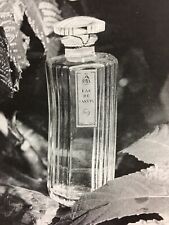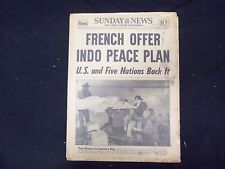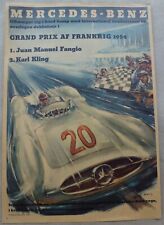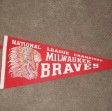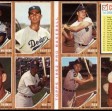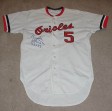When you click on links to various merchants on this site and make a purchase, this can result in this site earning a commission. Affiliate programs and affiliations include, but are not limited to, the eBay Partner Network.
DESCRIPTION : Here for sale is an original 1954 real - candid ACTION PHOTOGRAPH which was taken during a CONCERT of the renowned French cellist PAUL TORTELIER . TheCONCERT took place in 1954 in ISRAEL.TheIPOwith TORTELIER under the baton of FERENC FRISCAY played piecesby BARTOK , HAYDN and TCHAIKOWSKY. . It\'s an ORIGINAL ( Not a reprint !! ) silver gelatine ca 1950\'s - 1960\'s ACTION PHOTO. Taken from under the stage. It\'s an artistic REAL CANDID PHOTO. The PHOTOGRAPHER STAMP is on the verso. Around 9 x 7 \" .Excellent condition . Clean. ( Pls look at scan for accurate AS IS images )Will be sent inside a protective rigidpackaging .
PAYMENTS : Payment method accepted : Paypal .SHIPPMENT :SHIPP worldwide via registered airmail is $ 15 .Will be sent inside a protective packaging. Handling within 3-5 days after payment. Estimated Int\'l duration around 14 days.
Paul Tortelier (21 March 1914 – 18 December 1990) was a French cellist and composer.Tortelier was born in Paris, the son of a cabinet maker with Breton roots. He was encouraged to play the cello by his father Joseph and mother Marguerite (Boura), and at 12 he entered the Paris Conservatoire. He studied the cello there with Louis Feuillard and then Gérard Hekking. He won the first prize in cello at the conservatoire when he was 16, playing the Elgar cello concerto, and then he studied harmony under Jean Gallon. His debut was with the Orchestre Lamoureux in 1931 at the age of 17. He performed Lalo\'s Cello Concerto.In 1935 Tortelier joined the Monte-Carlo Philharmonic Orchestra as first cellist and played with them until 1937. He gave performances under Bruno Walter and Arturo Toscanini, and he also played the solo part in Richard Strauss\' Don Quixote under the composer. This is a piece which became closely associated with Tortelier, as he gave many performances and recorded it.In 1937 he joined the Boston Symphony Orchestra under Serge Koussevitsky, performing as first cellist through 1940. In 1938 he began a solo career at Boston\'s Town Hall, accompanied by Leonard Shure. He was first cellist of the Orchestre de la Société des Concerts du Conservatoire, Paris, 1946–47. In 1947 he gave his British debut under Beecham, again performing Don Quixote at the Festival of Richard Strauss in London. \"My boy\" Beecham said \"you will be successful in England because you have temperament\". In 1950 Tortelier was selected by Pablo Casals to play as the principal cellist in the Prades Festival Orchestra. Tortelier believed that of all the cellists, it was Casals who influenced him the most. A French critic wrote of him: \"If Casals is Jupiter, then Tortelier is Apollo.\" Tortelier performed for the Peabody Mason Concert series in Boston in 1952.[1]He was a music professor at the Conservatoire National Supérieur de la Musique, Paris (1956–69); Folkwang Hochschule in Essen (1969–1975); and the Conservatoire National de Region, Nice (1978–80). He was also an honorary professor at the Central Conservatoire in Beijing, China. Despite being French, he advised his students to avoid French music and concentrate on Beethoven and Mozart - music the public more likely wanted to hear.Although he was a Catholic, Tortelier was inspired by the ideals of the founders of the newly formed state of Israel in 1948, and in the years 1955–1956 spent some time living with his wife and two children in the kibbutz Maabarot, near Netanya.His compositions include a concerto for two cellos and orchestra (1950), a solo cello suite in D, and two sonatas for cello and piano. He also wrote a set of variations for cello and orchestra ( \'May Music Save Peace\' ). He also wrote a symphony, the Israel Symphony, after his experience of living in the kibbutz. His edition of the Bach Cello Suites was published by Galliard in 1966.He taught Jacqueline du Pré when she briefly attended his classes at the Paris Conservatoire, though he was not her main teacher (that was William Pleeth). Other students included Arto Noras, Nathan Waks and Raphaël Sommer. In the 1970s he gave a series of master classes which were recorded and broadcast on TV by the BBC, which demonstrate his very dynamic style of playing.Interests included bicycling and playing the flute. Besides performing on the cello, he made appearances as a conductor when he grew older (similar to Mstislav Rostropovich). Although it is sometimes mistakenly thought to be Rostropovich, Tortelier is the inventor of the angled cello spike, enabling the instrument to lie more horizontally than vertically.[2]Paul Tortelier was married twice. His first marriage, to Madeleine Gaston, ended in divorce in 1944. His second marriage was to Maud Monique Martin (also a cellist). His son, Yan Pascal Tortelier, is an internationally known conductor, and his daughter Maria de la Pau is a pianist. He died at the age of 76 in Villarceaux Yvelines, near Paris.Tortelier withdrew his children from formal education so that they could concentrate on music. He was asked about this during an interview with Huw Wheldon on British television, and when Wheldon asked if there were not authorities in France that make you send your children to school, he replied, \"I don\'t want to know anything about any authorities. I am a soloist and they will be soloists.\" Wheldon queried, \"but what happens if they don\'t become soloists?\" and, in some surprise, Tortelier said, \"Well, if you start thinking about what will happen if you don\'t succeed, you won\'t.\"RecordingsMajor recordings include the Bach Cello Suites in 1960 (Paris) and 1982 (London), Elgar\'s Cello Concerto with the London Philharmonic Orchestra, Adrian Boult conducting in 1972, and Strauss’s Don Quixote with the Royal Philharmonic Orchestra, Thomas Beecham conducting in 1947/48 and the Staatskapelle Dresden, Rudolf Kempe conducting in 1973 (all for EMI for whom he was under exclusive contract). Paul Tortelier, the famous French cellist, was born March 21, 1914 in Paris, where his father was a carpenter and cabinet-maker, who played the violin and the mandolin. He was given a cello at the age of six by his mother, who loved the cello and wanted a cellist for a son. She guided him every step of the way and followed every avenue for his advancement. Beatrice Bluhm was his first teacher, and she emphasized the flexible wrist and free bow arm of the Franco-Belgian school of cello technique. When Tortelier was ten he entered the Paris Conservatoire. There he studied with Feuillard and then with Gerard Hekking, who taught him to love Bach and to make the suites \"dance.\" When Tortelier was sixteen years old, he won first prize at the Conservatoire, while in Gerard Hekking\'s cello class. He had already gained much experience as a professional cellist, having performed in the cafes and cinemas of Paris. His first orchestral job was as assistant principal of the Paris Radio Orchestra. He played the Lalo Concerto, when he debuted in 1931 with the Concerts Lamoureux. He also performed with the Calvet Quartet. He studied harmony for three years with Jean Gallon in the Conservatoire (he received first prize in composition), and was a member of the Monte Carlo Symphony Orchestra from 1935 to 1937, where he played under the batons of Toscanini and Bruno Walter, as well as with Richard Strauss, who conducted his Don Quixote, with Tortelier playing the cello solo. (He became internationally associated with Don Quixote, and played it with many orchestras around the world.) In 1939 he became solo cellist with the Boston Symphony Orchestra under Serge Koussevitsky. He eventually performed concerts with all the famous conductors and orchestras of the mid-twentieth century. A French critic wrote, \"If Casals is Jupiter, then Tortelier is Apollo.\" Torterlier was a friend of Pablo Casals, and was invited to be principal cellist at the first Prades Festival, which commemorated the 200th anniversary of Bach\'s death. He admired Casals very much and imitated some of his technique. He said of Casals, \"...he was probably the first cellist to use his left hand in the manner of a pianist--that is, by normally placing only one finger on the string at a time, rather than keeping all the fingers clamped down. This allowed the fingers to vibrate freely.\" (From The Strad, April \'84) Ginsberg wrote, \"Creative fantasy and a youthful abandon are inherent in his performing style.\" Tortelier was so moved by the Israeli effort to establish a homeland that he moved to Israel to assist in the effort. He was forty years old then, at the height of his cellist powers. He and his wive and their two children lived in Mabaroth, a Kibbutz, just a few hundred yards from the enemy border. From 1956 to 1969 he was a professor at the Paris Conservatoire, and at the Folkwang Hochschule in Essen, from 1969 to 1975. Shortly thereafter he became the first Westerner to be an honorary Professor of Music at the Central Conservatoire in Beijing, China. He was a Frenchman, but advised his students to avoid French music. Not that he disliked it, but he realized that the public wanted to hear Beethoven and Mozart. He taught his students to be international in their musical tastes and performances. As is the case with Rostropovich, Tortelier gradually began to do more conducting as he grew older. He had an outgoing, lively personality, and taught master classes on British television. The classes were quite popular, even with people who knew little about the cello or classical music. Tortelier has a reputation for being a great story-teller, and a wide knowledge of art and literature, as well as music. He not only is an excellent performer, but also a composer of many cello works. His Sonata Breve (Bucephale), and Alla Maud are particularly well-known, as are his two cello concertos. His edition of the Bach Suites came out in 1966. He said, with regard to the Suites, \"To breathe life into music is more important than to prove respect for it.\" In 1971 he published his cello method, How I Play, How I Teach, which is particularly useful in training pupils to play modern music. He was founder and president of the \"Mouvement Beethoven Association,\" begun on the 200th anniversary of Beethoven\'s birth, and designed to support progressively-minded composers. Paul Tortelier died in December of 1990, at the age of 76. His musical legacy is carried forward by his son, Yan-Pascal Tortelier, the internationally famous conductor of the BBC Philharmonic (recording on the Chandos label). Amongst his better known cello students are Arto Noras, Raphael Sommer, and Jacqueline du Pre. Yan-Pascal\'s sons are presently collating the writings and compositions of their grandfather. For further information the reader is advised to read Ginsberg\'s History of the Violoncello, Campbell\'s The Great Cellists and Edward Seckerson\'s \"The French Connection.\" Paul Tortelier, a French cellist known for his elegant, passionate playing and for his political idealism, died of a heart attack on Tuesday at Villarceaux, France, near Paris, the news agency Reuters reported. He was 76 years old and lived in Nice.Mr. Tortelier spent most of his long career in Europe, where he was a professor at the Paris Conservatory, a busy soloist and an author. His master classes for the British Broadcasting Corporation attracted wide attention in 1964. Among his more notable pupils was the cellist Jacqueline du Pre. Mr. Tortelier, on the other hand, was busy in the United States both at the beginning and at the end of his musical life. In 1937, Serge Koussevitzky engaged him as a cellist for the Boston Symphony. From Boston he began an American solo career, including a 1938 Town Hall recital with the pianist Leonard Shure.A year later, Mr. Tortelier returned to France and remained. After a successful American tour in 1954, his career here dwindled, and by the time Lorin Maazel invited him again in the 1960\'s, the Vietnam War was in full swing. Mr. Tortelier, whose sensitivity to world politics was developed by his father in childhood, disagreed with America\'s stance on the war and refused the invitation. Winning a Prize at 16Early in the 1980\'s Mr. Tortelier returned to concerts in the United States, and after a 35-year absence he played in New York again a year ago. His last New York appearance was in February when he was a soloist with Bruno Weill and the New York Chamber Symphony. Writing in The New York Times, James R. Oestreich noted that Mr. Tortelier \"showed no concern for fashionable notions of proper period practice\" but that \"his playing was on the whole so eloquent that it swept those considerations aside.\"Paul Tortelier was born in Paris in 1914 and won a first prize at the Paris Conservatory at the age of 16. His debut came a year later at the Concerts Lamoureux. His international career had perhaps its biggest catalyst in 1947, when Sir Thomas Beecham invited him to play \"Don Quixote\" for a Richard Strauss festival in London. He was the author of \"How I Play, How I Teach,\" published in 1975.Mr. Tortelier\'s father was a cabinetmaker and a Marxist and engaged him in political debate at a young age. The cellist acted out his beliefs, retreating temporarily from musical life in 1955 to spend a year on an kibbutz in Israel even though he was not himself Jewish. Political idealism also affected his own compositions, which in their populist style bore such titles as \"The Great Flag\" (written for the United Nations) and \"May Music Save Peace\" performed at last February\'s concert.Mr. Tortelier married one of his pupils, Maud Martin, in 1946. They had three children, all professional musicians.He is survived by his wife, two daughters, Maria de la Pau and Pomona, and a son, Yan Pascal.




